新概念英语第三册课后练习答案第10课
- 格式:docx
- 大小:37.16 KB
- 文档页数:2
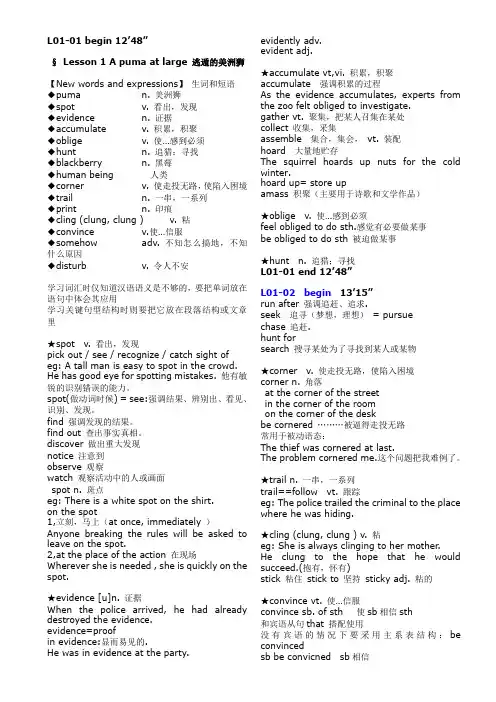
L01-01 begin 12’48”§Lesson 1 A puma at large 逃遁的美洲狮【New words and expressions】生词和短语◆puma n. 美洲狮◆spot v. 看出,发现◆evidence n. 证据◆accumulate v. 积累,积聚◆oblige v. 使…感到必须◆hunt n. 追猎;寻找◆blackberry n. 黑莓◆human being 人类◆corner v. 使走投无路,使陷入困境◆trail n. 一串,一系列◆print n. 印痕◆cling (clung, clung ) v. 粘◆convince v.使…信服◆somehow adv. 不知怎么搞地,不知什么原因◆disturb v. 令人不安学习词汇时仅知道汉语语义是不够的,要把单词放在语句中体会其应用学习关键句型结构时则要把它放在段落结构或文章里★spot v. 看出,发现pick out / see / recognize / catch sight of eg: A tall man is easy to spot in the crowd. He has good eye for spotting mistakes. 他有敏锐的识别错误的能力。
spot(做动词时候) = see:强调结果、辨别出、看见、识别、发现。
find 强调发现的结果。
find out 查出事实真相。
discover 做出重大发现notice 注意到observe 观察watch 观察活动中的人或画面spot n. 斑点eg: There is a white spot on the shirt.on the spot1,立刻,马上(at once, immediately )Anyone breaking the rules will be asked to leave on the spot.2,at the place of the action 在现场Wherever she is needed , she is quickly on the spot.★evidence [u]n. 证据When the police arrived, he had already destroyed the evidence.evidence=proofin evidence:显而易见的.He was in evidence at the party. evidently adv.evident adj.★accumulate vt,vi. 积累,积聚accumulate 强调积累的过程As the evidence accumulates, experts from the zoo felt obliged to investigate.gather vt. 聚集,把某人召集在某处collect 收集,采集assemble 集合,集会,vt. 装配hoard 大量地贮存The squirrel hoards up nuts for the cold winter.hoard up= store upamass 积聚(主要用于诗歌和文学作品)★oblige v. 使…感到必须feel obliged to do sth.感觉有必要做某事be obliged to do sth 被迫做某事★hunt n. 追猎;寻找L01-01 end 12’48”L01-02 begin 13’15”run after 强调追赶、追求.seek 追寻(梦想,理想)= pursuechase 追赶.hunt forsearch 搜寻某处为了寻找到某人或某物★corner v. 使走投无路,使陷入困境corner n. 角落at the corner of the streetin the corner of the roomon the corner of the deskbe cornered ………被逼得走投无路常用于被动语态:The thief was cornered at last.The problem cornered me.这个问题把我难例了。

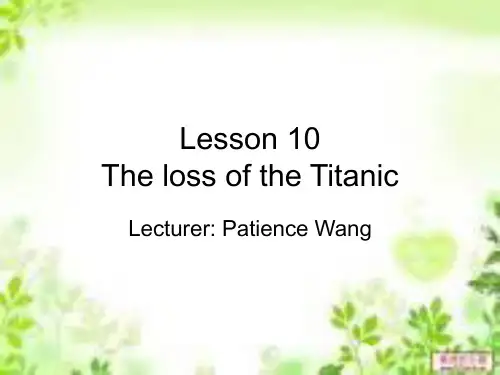
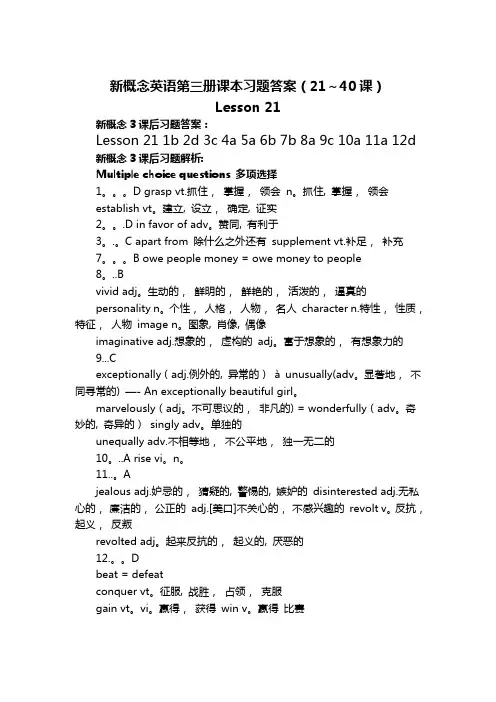
新概念英语第三册课本习题答案(21~40课)Lesson 21新概念3课后习题答案:Lesson 21 1b 2d 3c 4a 5a 6b 7b 8a 9c 10a 11a 12d 新概念3课后习题解析:Multiple choice questions 多项选择1。
D grasp vt.抓住,掌握,领会n。
抓住, 掌握,领会establish vt。
建立, 设立,确定, 证实2。
.D in favor of adv。
赞同, 有利于3。
.。
C apart from 除什么之外还有supplement vt.补足,补充7。
B owe people money = owe money to people8。
..Bvivid adj。
生动的,鲜明的,鲜艳的,活泼的,逼真的personality n。
个性,人格,人物,名人character n.特性,性质,特征,人物image n。
图象, 肖像, 偶像imaginative adj.想象的,虚构的adj。
富于想象的,有想象力的9...Cexceptionally(adj.例外的, 异常的)àunusually(adv。
显著地,不同寻常的) —- An exceptionally beautiful girl。
marvelously(adj。
不可思议的,非凡的) = wonderfully(adv。
奇妙的, 奇异的)singly adv。
单独的unequally adv.不相等地,不公平地,独一无二的10。
..A rise vi。
n。
11..。
Ajealous adj.妒忌的,猜疑的, 警惕的, 嫉妒的disinterested adj.无私心的,廉洁的,公正的adj.[美口]不关心的,不感兴趣的revolt v。
反抗,起义,反叛revolted adj。
起来反抗的,起义的, 厌恶的12.。
Dbeat = defeatconquer vt。
征服, 战胜,占领,克服gain vt。
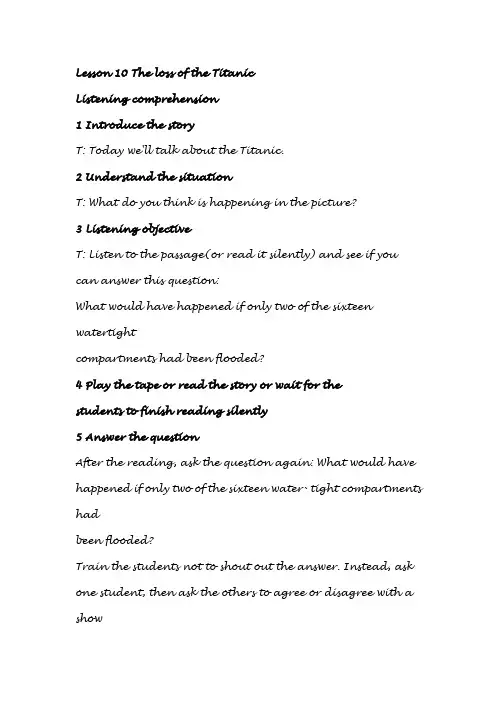
Lesson 10 The loss of the TitanicListening comprehension1 Introduce the storyT: Today we'll talk about the Titanic.2 Understand the situationT: What do you think is happening in the picture?3 Listening objectiveT: Listen to the passage(or read it silently) and see if you can answer this question:What would have happened if only two of the sixteen watertightcompartments had been flooded?4 Play the tape or read the story or wait for thestudents to finish reading silently5 Answer the questionAfter the reading, ask the question again: What would have happened if only two of the sixteen water- tight compartments hadbeen flooded?Train the students not to shout out the answer. Instead, ask one student, then ask the others to agree or disagree with a showof hands.Answer: The ship would have been able to float.6 Intensive readingPlay the tape or read the text again, pausing after every sentence to check the students understand.Obtain brief explanations to difficulties in the text from the students themselves. Only use Chinese if a confirmatory translation is necessary.7 Play the tape or read the story again8 Reading aloudAsk one or two students to read the text aloud. Comprehension questions1 On what date did the Titanic sail for New York from Southampton? (April 10th, 1912.)2 How many passengers was she carrying and how many crew? (1,316 passengers and a crew of 891.)3 How many tons was the Titanic?(46,000.)4 How did she compare with other ships at that time? (She was the largest that had ever been built.)5 Why was she regarded as unsinkable? (Because she had sixteenwatertight compartments.)6 If these were flooded, would the ship still float? (No,it/she wouldn't.)7 Had the Titanic ever sailed before?(No, it/she hadn't.)8 It was her first voyage, wasn't it?(Yes, it was.)9 How many days had she been at sea when the iceberg was spotted?(Four days.)10 Where was the ship at the time? (In the North Atlantic.)11 What did she do to avoid direct collision?(Turn sharply.)12 How high was the wall of ice? (100 feet.)13 What was heard from below?(A slight trembling sound.)14 What did the captain do? (He went down to see what had happened.)15 Did the captain think the ship had been damaged? (No, he didn't.)16 Why did no one think the ship had been damaged? (The noisehad been so faint.)17 What was actually happening to the ship? (It/She was sinking rapidly.)18 How many of her compartments had been flooded?(Five.)19 What order was given to the people on board?(Abandon ship.)20 Why were so many lives lost?(Because there weren't enough lifeboats.)Asking questions: Ask me if⋯T: Ask me if the Titanic sailed from Southampton.S: Did the Titanic sail from Southampton?T: Where⋯?S: Where did the Titanic sail from?1 the Titanic sailed from Southampton.(Where)2 she was carrying 1,316 passengers.(How many passengers)3 she was regarded as unsinkable.(Why)4 she had sixteen watertight compartments. (How many)5 an iceberg was spotted.(How many days after setting out)6 the ship turned sharply.(Why)7 the wall of ice rose over 100 feet out of the water.(How high)8 the captain realized the ship was sinking.(What)9 five of her compartments had been flooded. (How many)10 1,500 lives were lost.(How many)Tell us about the sinking of the Titanic1 Four days----setting sail----icy waters----NorthAtlantic----huge iceberg----lookout2 Alarm given----great ship turned sharply----collision3 Just in time---- missed wall of ice----100 feet---- beside her4 Suddenly----slight trembling----below----captain----what happened5 Noise----faint----no one thought----ship----damaged6 Captain realized----Titanic sinking fast----five/sixteen compartments----flooded7 Order----abandon ship----hundreds of people----icy water8 Not enough lifeboats----1,500 lives lostTopics for discussion1 Tell us what you know about any major transport disaster in the sea, in the air, or on land.2 Tell us what you know about the largest planes, ships and trains being built today.3 Which is the safest form of travel? Why?Key to Summary writingPoints1 Titanic----sailing icy waters, N.Atlantic2 Iceberg ----lookout3 Alarm given---- ship turned sharply4 Sailed alongside iceberg5 Faint noise---- heard from below6 Captain----down to investigate7 Found five of sixteen compartments flooded8 Order----abandon ship----people overboard9 1,500 people drowned----not enough lifeboatsSummaryThe Titanic was sailing across the icy waters of the North Atlantic when an iceberg was spotted by a lookout. After the alarmwas given, the ship turned sharply and sailed alongside it. Suddenly, a faint noise was heard from b elow, so the captain wentdown to investigate, only to find that five of the sixteen compartments had been flooded. On hearing the order to abandonship, people jumped overboard, but 1,500 drowned because therewere not enough lifeboats. (79 words)Key to VocabularyA possible answercolossal(1.4) immense, hugeregarded(1.5) considered, thought to becompartments(1.6) sections, divisionsflooded(1.7) filled with waterfloat (1.7) stay on the surface of the wateravoid(1.11) escape, missnarrowly(1.11) only justKey to CompositionA possible answerAbandon snipThe Titanic began to sink, slowly at first. The order to abandonship was unexpected, so passengers and crew were completely unprepared. It was the middle of the night. Some people were asleep in their cabins.Others were on deck admiring the brilliantnight sky and the giant icebergs rising above them. Others wereeating and dancing in the wonderful ballrooms on the ship. The immediate effect was panic and confusion. People began rushing in all directions, wondering what to do next. The coldwas indescribable and many passengers were still in their nightclothes. Members of the crew came up from below and began tolowerthe lifeboats. It was a case of women and children first, but it soon became obvious that there weren't enough lifeboats for everyone, so people jumped overboard into the freezing water in order to save their lives. Some of those swimming in the waterstruggled to get into the lifeboats, but most of them were alreadyfull.The Titanic sank rapidly, carrying many people downwith it. There were cries of despair from people in the water as they watched the lifeboats moving away and were left to drown in the icy ocean.(200 words)Key to Letter writingThe middle address is correct.Key structures: the past perfectWe use the past perfect to refer to the first of two past actions in a sequence:The children ran away (simple past) after they had broken (pastperfect) the window.(=First they broke the window: past perfect; then they ran away: simple past.)1KS14Or we use the past perfect to refer to‘an earlier past’:He had lived in Scotland for fifteen years before he came to England. 1KS38Key to KS ExercisesA See text.B 1 At that time, she was the largest ship that had ever been built.2 After the alarm had been given, the great ship turned sharply to avoid a direct collision.Special difficulties: forming nounsWe can form nouns from other parts of speech:He works (verb) hard. → He is a hard worker. (noun)He plays the violin. (noun)→ He is a violinist.(noun)He is very careless.(adjective) →I have never seen such carelessness.(noun)He has a responsible(adjective) position. → He has a lot of responsibility. (noun)Key to SD Exercises1 physicist2 miner3 humanity4 impression5 originalityRepetition drillThe past perfectChorus, group or individual repetitionTo elicit negative and affirmative statements involving the use of the past perfect after if only to express a past unfulfilled wish.T: Drill 10. Listen. Do not speak.(1) T: I'm sorry I didn't mention it!S: If only you had mentioned it! You would have saved me a lotof trouble.(2) T: She's sorry she told himS: If only she hadn't told him! She would have saved me a lot of trouble.(3) T: He's sorry he didn't come!S: If only he had come! He would have saved me a lot of trouble.T: Now you do the same. Ready?1 As in(1)above.2 As in(2) above.3 As in(3) above.4 T: I'm sorry I didn't post it!S: If only you had posted it! You would have saved me a lotof trouble.5 T: She's sorry she telephoned!S: If only she hadn't telephoned! She would have saved me a lot of trouble.6 T: He's sorry he didn't help her!S: If only he had helped her! He would have saved me a lotof trouble.7 T: They're sorry they didn't wait!S: If only they had waited! They would have saved me a lot of trouble.8 T: I'm sorry I bought it!S: If only you hadn't bought it! You would have saved me a lot of trouble.9 T: He's sorry he didn't keep it!S: If only he had kept it! He would have saved me a lotof trouble.10 T: She's sorry she didn't sell it!S: If only she had sold it! She would have saved me a lot of trouble.11 T: They're sorry they got it!S: If only they hadn't got it! They would have saved me a lotof trouble.12 T: I'm sorry I didn't find it !S: If only you had found it! You would have saved me a lot of trouble.13 T: She's sorry she didn't shut it!S: If only she had shut it! She would have saved me a lot of trouble.14 T: I'm sorry I wrote to him!S: If only you hadn' t written to him! You would have saved me a lot of trouble.15 T: She's sorry she didn't ring.S: If only she had rung! She would have saved me a lot of trouble.Key to Multiple choice questions1 d2 c3 a4 b5 d6 d7 b 8 d 9 a 10 c 11 b 12 a。
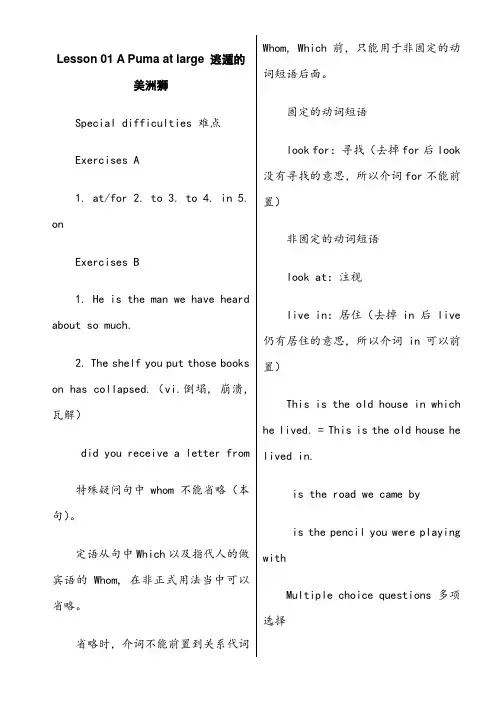
Lesson 01 A Puma at large 逃遁的美洲狮Special difficulties 难点Exercises A1. at/for2. to3. to4. in5. onExercises B1. He is the man we have heard about so much.2. The shelf you put those books on has collapsed.(vi.倒塌, 崩溃, 瓦解)did you receive a letter from特殊疑问句中whom 不能省略(本句)。
定语从句中Which以及指代人的做宾语的Whom, 在非正式用法当中可以省略。
省略时,介词不能前置到关系代词Whom, Which前,只能用于非固定的动词短语后面。
固定的动词短语look for:寻找(去掉for后look 没有寻找的意思,所以介词for不能前置)非固定的动词短语look at:注视live in:居住(去掉in后live 仍有居住的意思,所以介词in可以前置)This is the old house in which he lived. = This is the old house he lived in.is the road we came byis the pencil you were playing withMultiple choice questions 多项选择1…正确答案:Din common adv.共有(替换了similar)2…正确答案:BA)只是一个具体的特定的事列,阅读理解题的时候要把握中心大意B) large catpersuade v.说服, 劝说3…答案正确:C做理解题时要紧扣主题、紧扣中心大意文章最后一句话总结了大意句型结构题和词汇题是每课的关键4…答案正确:CMake的用法:make somebody do(在主动语态中不定式的符号to应该省略)be made to do(被动语态中不定式的符号to必须补充完整)-- They made her wait for hours. à She was made to wait for hours.5…答案正确: DA)把say改成claim就对了(-- People claimed to have seen the puma.)D)清楚的道明了动作发生的先后关系6…正确答案:B原句中的 when引导的时间状语从句表示:-...就…(as soon as)被动:On being observed, it immediately ran away.主动:On observing her, it immediately ran away.On seeing me, he waved to me.7…正确答案:Dexcept可以和名词/名词性从句进行搭配(也可是when/if引导的从句形式)unless = if...not = except on the condition that…when = if-- …except when they are cornered. = …except if they are cornered.-- Whenever you come, you are welcome. = If ever you come, you are welcome.8…正确答案:DA)must be只是对客观现实的推测,时态不一致-- 对于过去事实推测一定要用:情态动词+ have +过去分词9…正确答案:Con more than = nothing more than = only / within = not more than10…正确答案:Bin a corner 偷偷摸摸地, 暗中地, 秘密地in a trap 落于陷阱中at an angle 不正的, 倾斜的(angle n.角, 角度, 角落, 墙角, 棱角)under cover 在遮蔽处, 秘密地, 暗中11... 正确答案:Bfishes for pleasure 钓鱼消遣travel for pleasure 外出游玩read for pleasure 阅读消遣12…on one’s own adv.独自地, 独立地, 主动地(= alone)for one’s own benefit 为了某人自己的利益。
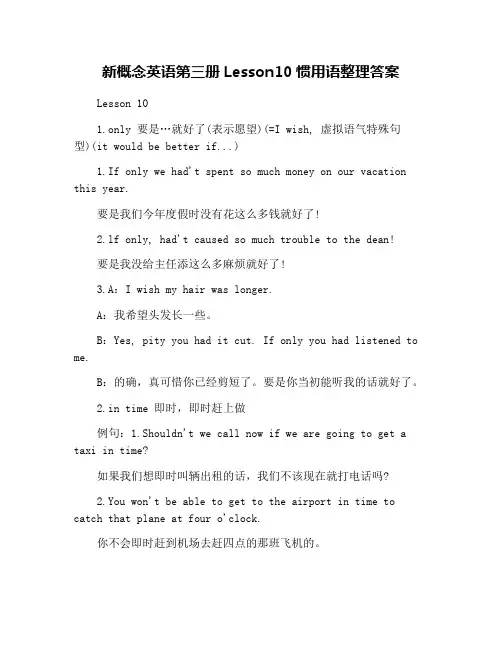
新概念英语第三册Lesson10惯用语整理答案Lesson 101.only 要是…就好了(表示愿望)(=I wish, 虚拟语气特殊句型)(it would be better if...)1.If only we had't spent so much money on our vacation this year.要是我们今年度假时没有花这么多钱就好了!2.lf only, had't caused so much trouble to the dean!要是我没给主任添这么多麻烦就好了!3.A:I wish my hair was longer.A:我希望头发长一些。
B:Yes, pity you had it cut. If only you had listened to me.B:的确,真可惜你已经剪短了。
要是你当初能听我的话就好了。
2.in time 即时,即时赶上做例句:1.Shouldn't we call now if we are going to get a taxi in time?如果我们想即时叫辆出租的话,我们不该现在就打电话吗?2.You won't be able to get to the airport in time to catch that plane at four o'clock.你不会即时赶到机场去赶四点的那班飞机的。
3.I saw the pitcher of water about to fall. but Icouldn't reach it in time.我看见那水罐就要倒了,不过没来得及抓住。
3.miss v. 未击中,未抓住;错过,未赶上;未理解;惦念,想念;逃脱,遗漏,省掉miss by (time)差...没赶上(miss sth.with a delay of...)1.You just misssd the nine-thirty bus by five minutes.你差5分钟没赶上9:30的公共汽车。
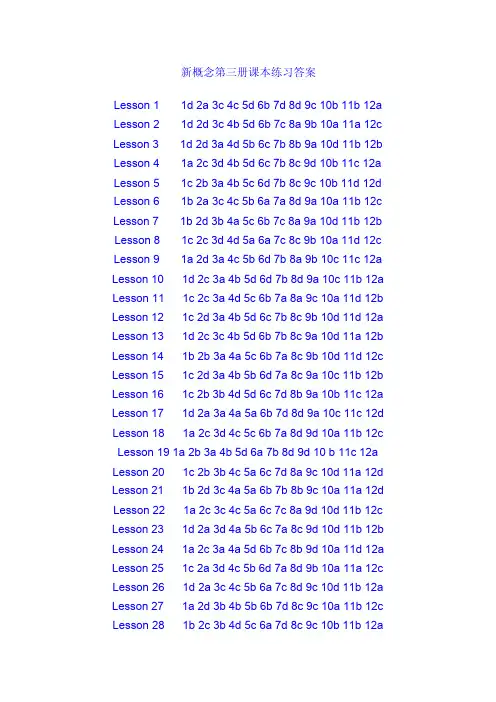
新概念第三册课本练习答案Lesson 1 1d 2a 3c 4c 5d 6b 7d 8d 9c 10b 11b 12a Lesson 2 1d 2d 3c 4b 5d 6b 7c 8a 9b 10a 11a 12c Lesson 3 1d 2d 3a 4d 5b 6c 7b 8b 9a 10d 11b 12b Lesson 4 1a 2c 3d 4b 5d 6c 7b 8c 9d 10b 11c 12a Lesson 5 1c 2b 3a 4b 5c 6d 7b 8c 9c 10b 11d 12d Lesson 6 1b 2a 3c 4c 5b 6a 7a 8d 9a 10a 11b 12c Lesson 7 1b 2d 3b 4a 5c 6b 7c 8a 9a 10d 11b 12b Lesson 8 1c 2c 3d 4d 5a 6a 7c 8c 9b 10a 11d 12c Lesson 9 1a 2d 3a 4c 5b 6d 7b 8a 9b 10c 11c 12a Lesson 10 1d 2c 3a 4b 5d 6d 7b 8d 9a 10c 11b 12a Lesson 11 1c 2c 3a 4d 5c 6b 7a 8a 9c 10a 11d 12b Lesson 12 1c 2d 3a 4b 5d 6c 7b 8c 9b 10d 11d 12a Lesson 13 1d 2c 3c 4b 5d 6b 7b 8c 9a 10d 11a 12b Lesson 14 1b 2b 3a 4a 5c 6b 7a 8c 9b 10d 11d 12c Lesson 15 1c 2d 3a 4b 5b 6d 7a 8c 9a 10c 11b 12b Lesson 16 1c 2b 3b 4d 5d 6c 7d 8b 9a 10b 11c 12a Lesson 17 1d 2a 3a 4a 5a 6b 7d 8d 9a 10c 11c 12d Lesson 18 1a 2c 3d 4c 5c 6b 7a 8d 9d 10a 11b 12c Lesson 19 1a 2b 3a 4b 5d 6a 7b 8d 9d 10 b 11c 12a Lesson 20 1c 2b 3b 4c 5a 6c 7d 8a 9c 10d 11a 12d Lesson 21 1b 2d 3c 4a 5a 6b 7b 8b 9c 10a 11a 12d Lesson 22 1a 2c 3c 4c 5a 6c 7c 8a 9d 10d 11b 12c Lesson 23 1d 2a 3d 4a 5b 6c 7a 8c 9d 10d 11b 12b Lesson 24 1a 2c 3a 4a 5d 6b 7c 8b 9d 10a 11d 12a Lesson 25 1c 2a 3d 4c 5b 6d 7a 8d 9b 10a 11a 12c Lesson 26 1d 2a 3c 4c 5b 6a 7c 8d 9c 10d 11b 12a Lesson 27 1a 2d 3b 4b 5b 6b 7d 8c 9c 10a 11b 12c Lesson 28 1b 2c 3b 4d 5c 6a 7d 8c 9c 10b 11b 12aLesson 29 1c 2b 3a 4a 5a 6a 7b 8c 9 d 10d 11c 12b Lesson 30 1d 2a 3d 4b 5c 6b 7a 8a 9c 10b 11d 12a Lesson 31 1b 2b 3d 4b 5b 6a 7a 8a 9d 10d 11c 12d Lesson 32 1a 2b 3a 4c 5b 6d 7c 8c 9d 10b 11c 12a Lesson 33 1c 2b 3a 4b 5d 6a 7a 8c 9c 10b 11a 12d Lesson 34 1b 2b 3c 4b 5d 6c 7a 8d 9c 10b 11a 12c Lesson 35 1c 2b 3b 4d 5c 6d 7c 8c 9a 10d 11b 12d Lesson 36 1d 2c 3c 4b 5d 6a 7b 8b 9d 10c 11a 12d Lesson 37 1b 2c 3a 4b 5c 6a 7d 8c 9d 10d 11b 12a Lesson 38 1b 2d 3a 4d 5c 6b 7c 8b 9a 10a 11c 12a Lesson 39 1c 2a 3a 4d 5a 6d 7b 8c 9a 10c 11b 12c Lesson 40 1a 2c 3c 4d 5a 6d 7c 8c 9b 10a 11d 12a Lesson 41 1d 2b 3a 4c 5a 6c 7b 8b 9a 10b 11b 12a Lesson 42 1d 2a 3b 4c 5c 6b 7d 8b 9c 10a 11d 12b Lesson 43 1b 2c 3c 4b 5b 6a 7d 8c 9c 10a 11d 12b Lesson 44 1d 2c 3c 4d 5b 6a 7c 8d 9b 10a 11c 12b Lesson 45 1b 2d 3d 4b 5a 6a 7b 8a 9d 10c 11c 12a Lesson 46 1c 2d 3d 4c 5d 6a 7b 8c 9b 10a 11c 12b Lesson 47 1c 2b 3a 4c 5a 6c 7a 8a 9c 10c 11a 12b Lesson 48 1a 2b 3c 4d 5a 6a 7c 8d 9b 10c 11b 12a Lesson 49 1b 2d 3d 4c 5d 6c 7c 8a 9c 10b 11a 12c Lesson 50 1c 2a 3d 4d 5b 6c 7b 8a 9c 10c 11b 12b Lesson 51 1c 2b 3d 4b 5c 6a 7a 8a 9a 10b 11a 12a Lesson 52 1a 2c 3d 4b 5c 6d 7b 8a 9c 10d 11a 12d Lesson 53 1c 2d 3c 4b 5a 6c 7a 8a 9c 10a 11b 12b Lesson 54 1b 2d 3a 4c 5c 6a 7c 8d 9b 10b 11b 12c Lesson 55 1b 2c 3a 4b 5c 6a 7a 8c 9a 10c 11b 12a Lesson 56 1b 2a 3c 4c 5d 6c 7b 8c 9a 10d 11c 12aLesson 57 1d 2d 3b 4a 5c 6b 7c 新概念第三册课本练习答案Lesson 1 1d 2a 3c 4c 5d 6b 7d 8d 9c 10b 11b 12aLesson 2 1d 2d 3c 4b 5d 6b 7c 8a 9b 10a 11a 12cLesson 3 1d 2d 3a 4d 5b 6c 7b 8b 9a 10d 11b 12bLesson 4 1a 2c 3d 4b 5d 6c 7b 8c 9d 10b 11c 12aLesson 5 1c 2b 3a 4b 5c 6d 7b 8c 9c 10b 11d 12dLesson 6 1b 2a 3c 4c 5b 6a 7a 8d 9a 10a 11b 12cLesson 7 1b 2d 3b 4a 5c 6b 7c 8a 9a 10d 11b 12bLesson 8 1c 2c 3d 4d 5a 6a 7c 8c 9b 10a 11d 12cLesson 9 1a 2d 3a 4c 5b 6d 7b 8a 9b 10c 11c 12aLesson 10 1d 2c 3a 4b 5d 6d 7b 8d 9a 10c 11b 12aLesson 11 1c 2c 3a 4d 5c 6b 7a 8a 9c 10a 11d 12bLesson 12 1c 2d 3a 4b 5d 6c 7b 8c 9b 10d 11d 12aLesson 13 1d 2c 3c 4b 5d 6b 7b 8c 9a 10d 11a 12bLesson 14 1b 2b 3a 4a 5c 6b 7a 8c 9b 10d 11d 12cLesson 15 1c 2d 3a 4b 5b 6d 7a 8c 9a 10c 11b 12bLesson 16 1c 2b 3b 4d 5d 6c 7d 8b 9a 10b 11c 12aLesson 17 1d 2a 3a 4a 5a 6b 7d 8d 9a 10c 11c 12dLesson 18 1a 2c 3d 4c 5c 6b 7a 8d 9d 10a 11b 12cLesson 19 1a 2b 3a 4b 5d 6a 7b 8d 9d 10 b 11c 12aLesson 20 1c 2b 3b 4c 5a 6c 7d 8a 9c 10d 11a 12dLesson 21 1b 2d 3c 4a 5a 6b 7b 8b 9c 10a 11a 12dLesson 22 1a 2c 3c 4c 5a 6c 7c 8a 9d 10d 11b 12cLesson 23 1d 2a 3d 4a 5b 6c 7a 8c 9d 10d 11b 12bLesson 24 1a 2c 3a 4a 5d 6b 7c 8b 9d 10a 11d 12aLesson 25 1c 2a 3d 4c 5b 6d 7a 8d 9b 10a 11a 12cLesson 26 1d 2a 3c 4c 5b 6a 7c 8d 9c 10d 11b 12aLesson 27 1a 2d 3b 4b 5b 6b 7d 8c 9c 10a 11b 12cLesson 28 1b 2c 3b 4d 5c 6a 7d 8c 9c 10b 11b 12aLesson 29 1c 2b 3a 4a 5a 6a 7b 8c 9 d 10d 11c 12b Lesson 30 1d 2a 3d 4b 5c 6b 7a 8a 9c 10b 11d 12a Lesson 31 1b 2b 3d 4b 5b 6a 7a 8a 9d 10d 11c 12d Lesson 32 1a 2b 3a 4c 5b 6d 7c 8c 9d 10b 11c 12a Lesson 33 1c 2b 3a 4b 5d 6a 7a 8c 9c 10b 11a 12d Lesson 34 1b 2b 3c 4b 5d 6c 7a 8d 9c 10b 11a 12c Lesson 35 1c 2b 3b 4d 5c 6d 7c 8c 9a 10d 11b 12d Lesson 36 1d 2c 3c 4b 5d 6a 7b 8b 9d 10c 11a 12d Lesson 37 1b 2c 3a 4b 5c 6a 7d 8c 9d 10d 11b 12a Lesson 38 1b 2d 3a 4d 5c 6b 7c 8b 9a 10a 11c 12a Lesson 39 1c 2a 3a 4d 5a 6d 7b 8c 9a 10c 11b 12c Lesson 40 1a 2c 3c 4d 5a 6d 7c 8c 9b 10a 11d 12a Lesson 41 1d 2b 3a 4c 5a 6c 7b 8b 9a 10b 11b 12a Lesson 42 1d 2a 3b 4c 5c 6b 7d 8b 9c 10a 11d 12b Lesson 43 1b 2c 3c 4b 5b 6a 7d 8c 9c 10a 11d 12b Lesson 44 1d 2c 3c 4d 5b 6a 7c 8d 9b 10a 11c 12b Lesson 45 1b 2d 3d 4b 5a 6a 7b 8a 9d 10c 11c 12a Lesson 46 1c 2d 3d 4c 5d 6a 7b 8c 9b 10a 11c 12b Lesson 47 1c 2b 3a 4c 5a 6c 7a 8a 9c 10c 11a 12b Lesson 48 1a 2b 3c 4d 5a 6a 7c 8d 9b 10c 11b 12a Lesson 49 1b 2d 3d 4c 5d 6c 7c 8a 9c 10b 11a 12c Lesson 50 1c 2a 3d 4d 5b 6c 7b 8a 9c 10c 11b 12b Lesson 51 1c 2b 3d 4b 5c 6a 7a 8a 9a 10b 11a 12a Lesson 52 1a 2c 3d 4b 5c 6d 7b 8a 9c 10d 11a 12d Lesson 53 1c 2d 3c 4b 5a 6c 7a 8a 9c 10a 11b 12b Lesson 54 1b 2d 3a 4c 5c 6a 7c 8d 9b 10b 11b 12c Lesson 55 1b 2c 3a 4b 5c 6a 7a 8c 9a 10c 11b 12a Lesson 56 1b 2a 3c 4c 5d 6c 7b 8c 9a 10d 11c 12a Lesson 57 1d 2d 3b 4a 5c 6b 7c 8d 9a 10c 11c 12b Lesson 58 1c 2b 3d 4a 5a 6a 7c 8a 9b 10b 11d 12dLesson 59 1a 2d 3a 4d 5b 6d 7d 8b 9b 10a 11d 12bLesson 60 1b 2b 3d 4b 5b 6c 7a 8c 9c 10b 11a 12c谣言:吃太咸了会得病?导语:“人体每日摄入食盐不应过多,否则易患多种疾病。
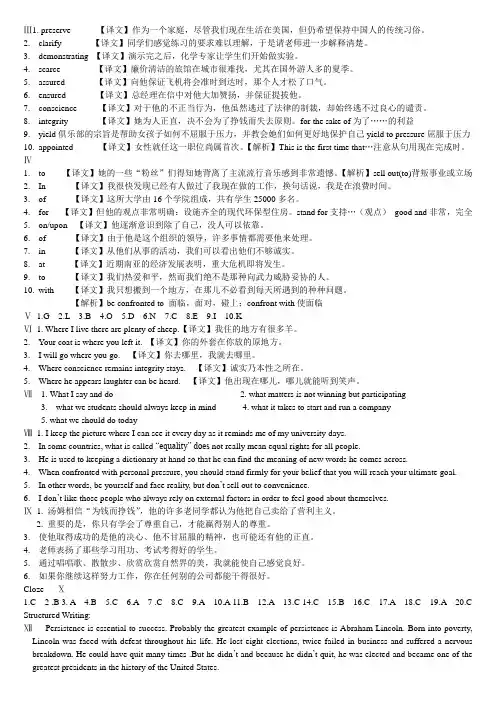
Ⅲ1. preserve 【译文】作为一个家庭,尽管我们现在生活在美国,但仍希望保持中国人的传统习俗。
2.clarify 【译文】同学们感觉练习的要求难以理解,于是请老师进一步解释清楚。
3.demonstrating 【译文】演示完之后,化学专家让学生们开始做实验。
4.scarce 【译文】廉价清洁的旅馆在城市很难找,尤其在国外游人多的夏季。
5.assured 【译文】向他保证飞机将会准时到达时,那个人才松了口气。
6.ensured 【译文】总经理在信中对他大加赞扬,并保证提拔他。
7.conscience 【译文】对于他的不正当行为,他虽然逃过了法律的制裁,却始终逃不过良心的谴责。
8.integrity 【译文】她为人正直,决不会为了挣钱而失去原则。
for the sake of为了……的利益9.yield俱乐部的宗旨是帮助女孩子如何不屈服于压力,并教会她们如何更好地保护自己yield to pressure屈服于压力10.appointed 【译文】女性就任这一职位尚属首次。
【解析】This is the first time that…注意从句用现在完成时。
Ⅳ1.to 【译文】她的一些“粉丝”们得知她背离了主流流行音乐感到非常遗憾。
【解析】sell out(to)背叛事业或立场2.In 【译文】我很快发现已经有人做过了我现在做的工作,换句话说,我是在浪费时间。
3.of 【译文】这所大学由16个学院组成,共有学生25000多名。
4.for 【译文】但他的观点非常明确:设施齐全的现代环保型住房。
stand for支持…(观点)good and非常,完全5.on/upon 【译文】他逐渐意识到除了自己,没人可以依靠。
6.of 【译文】由于他是这个组织的领导,许多事情都需要他来处理。
7.in 【译文】从他们从事的活动,我们可以看出他们不够诚实。
8.at 【译文】近期南亚的经济发展表明,重大危机即将发生。
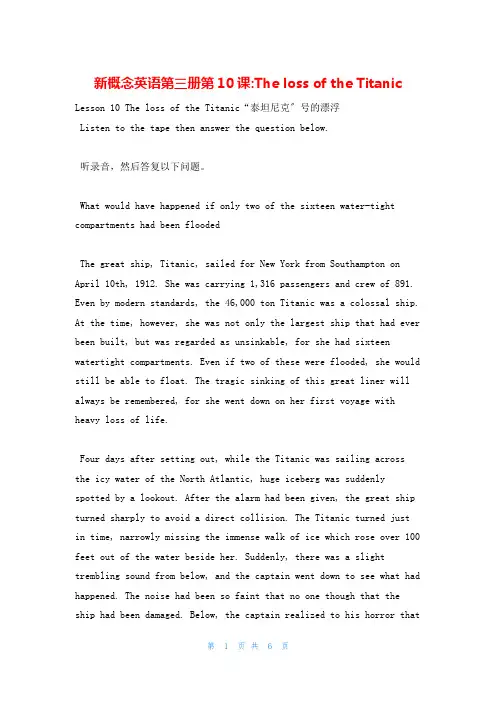
新概念英语第三册第10课:The loss of the Titanic Lesson 10 The loss of the Titanic“泰坦尼克〞号的漂浮Listen to the tape then answer the question below.听录音,然后答复以下问题。
What would have happened if only two of the sixteen water-tight compartments had been floodedThe great ship, Titanic, sailed for New York from Southampton on April 10th, 1912. She was carrying 1,316 passengers and crew of 891. Even by modern standards, the 46,000 ton Titanic was a colossal ship. At the time, however, she was not only the largest ship that had ever been built, but was regarded as unsinkable, for she had sixteen watertight compartments. Even if two of these were flooded, she would still be able to float. The tragic sinking of this great liner will always be remembered, for she went down on her first voyage with heavy loss of life.Four days after setting out, while the Titanic was sailing across the icy water of the North Atlantic, huge iceberg was suddenly spotted by a lookout. After the alarm had been given, the great ship turned sharply to avoid a direct collision. The Titanic turned justin time, narrowly missing the immense walk of ice which rose over 100 feet out of the water beside her. Suddenly, there was a slight trembling sound from below, and the captain went down to see what had happened. The noise had been so faint that no one though that the ship had been damaged. Below, the captain realized to his horror thatthe Titanic was sinking rapidly, for five of her sixteen watertight compartments had already been flooded! The order to abandon ship was given and hundreds of people plunged into the icy water. As there were not enough lifeboats for everybody, 1,500 lives were lost.参考译文巨轮“泰坦尼克〞号1912年4月10日从南安普敦起锚驶向纽约。
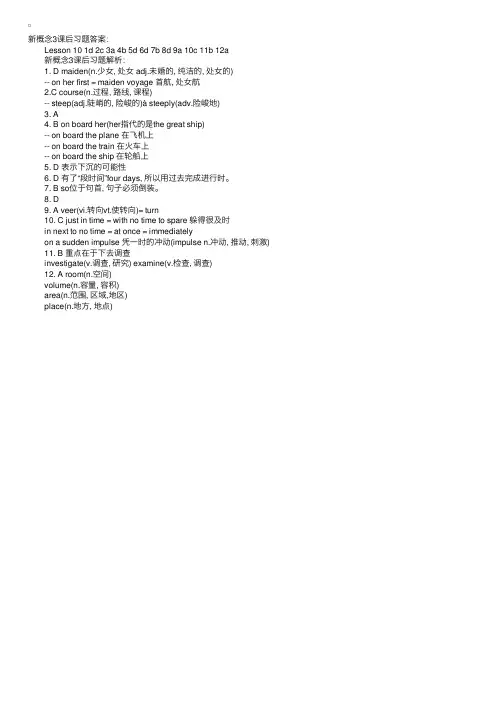
新概念3课后习题答案: Lesson 10 1d 2c 3a 4b 5d 6d 7b 8d 9a 10c 11b 12a 新概念3课后习题解析: 1. D maiden(n.少⼥, 处⼥ adj.未婚的, 纯洁的, 处⼥的) -- on her first = maiden voyage ⾸航, 处⼥航 2.C course(n.过程, 路线, 课程) -- steep(adj.陡峭的, 险峻的)à steeply(adv.险峻地) 3. A 4. B on board her(her指代的是the great ship) -- on board the plane 在飞机上 -- on board the train 在⽕车上 -- on board the ship 在轮船上 5. D 表⽰下沉的可能性 6. D 有了“段时间”four days, 所以⽤过去完成进⾏时。
7. B so位于句⾸, 句⼦必须倒装。
8. D 9. A veer(vi.转向vt.使转向)= turn 10. C just in time = with no time to spare 躲得很及时 in next to no time = at once = immediately on a sudden impulse 凭⼀时的冲动(impulse n.冲动, 推动, 刺激) 11. B 重点在于下去调查 investigate(v.调查, 研究) examine(v.检查, 调查) 12. A room(n.空间) volume(n.容量, 容积) area(n.范围, 区域,地区) place(n.地⽅, 地点)。
新概念英语第三册课后练习答案及解析(Lessons10~12 )新概念英语第三册课后练习答案及解析(Lessons10)Special difficulties 难点1>动词后加-er如果是以不发音的e结尾的, 只加r(表示行为的主动者, 做某事的人)。
work à worker / teachàteacher / writeàwriter / readàreadermurder(vt.谋杀, 凶杀)à murderer(n.杀人犯, 凶手)2>动词、名词后加-ist (表示某种主义信仰者, 从事某种职业、研究的人。
)Copy à copyist(n.抄写员, 模仿者) 无效 à typist(n.打字员)novel(n.小说, 长篇故事)à novelist(n.小说作家)drug(n.药)à druggist(n.药商, 药剂师) tobacco(n.烟草, 烟草制品)à tobacconist(n.烟草商, 烟店)3 >形容词后加-ness(抽象名词, 表示一种性质、情况、状态)kind à kindness(n.仁慈, 亲切, 好意, 善意) bitter à bitterness(n.苦味, 辛酸, 苦难) happy àhappiness(n.幸福, 快乐)--- 以结尾要变y为i加ness. willing(adj.乐意的, 自愿的)àwillingness(n.自动自发,积极肯干)4>某些动词后加-ion,构成名词。
Suggest à suggestion possess(vt.占有, 拥有, 持有)àpossession(n.拥有, 占有)collect à collection(n.收藏, 搜集品)以-te结尾的动词, 把不发音的-e去掉, 在加-ion.Translate(vt.翻译, 解释, 转化) à translation(n.翻译, 译文, 转化)complete à completion(n.完成)graduate(v.(使)(大学)毕业)à graduation(n.毕业, 毕业典礼)某些以-aim/-ain结尾的动词、把-i去掉,在加-ation.Explain(v.解释, 说明)à explanation(n.解释, 解说, 说明) Exclaim(v.呼喊, 惊叫, 大声叫)àexclamation(n.惊叫, 喊叫)5>(以-able/-ible结尾的)形容词之后加-ity变成(以-ability/-ibility结尾的)抽象名词 (表示性质、状态) able à ability probable(adj.很可能的, 大概的)à probability(n.可能性, 或然性, 概率)possible(adj.可能的)à possibility(n.可能性, 可能发生的事物)mobile(adj.可移动的, 机动的)à mobility(n.活动性, 灵活性, 机动性) Exercise:Violin(n.小提琴)à violinist(n.小提琴演奏者, 小提琴家)Responsible(adj.有责任的, 可靠的)à responsibility(n.责任, 职责)Careless(adj.粗心的, 疏忽的) à carelessness1> physics(n.物理学)à physicist(n.物理学者, 唯物论者)2> mine(n.矿v.开采, 开矿)à miner(n.矿工)3> human(n.人类adj.人类的)à humanity(n.人性, 人类)4> impress(vt.留下印象)à impression(n.印象, 感想)-- make a good impression5> original(adj.最初的, 原始的)à originality(n.创意, 创造性) Multiple choice questions 多项选择新概念3课后习题答案:Lesson 10 1d 2c 3a 4b 5d 6d 7b 8d 9a 10c 11b 12a新概念3课后习题解析:1. D maiden(n.少女, 处女 adj.未婚的, 纯洁的, 处女的)-- on her first = maiden voyage 首航, 处女航2. C course(n.过程, 路线, 课程)-- steep(adj.陡峭的, 险峻的)à steeply(adv.险峻地)3. A4. B on board her(her指代的是the great ship)-- on board the plane 在飞机上-- on board the train 在火车上-- on board the ship 在轮船上5. D 表示下沉的可能性6. D 有了“段时间”four days, 所以用过去完成进行时。
新概念英语第三册第十课
摘要:
一、新概念英语第三册第十课概述
1.课文标题:A fine day
2.作者:L.G.Alexander
3.主要内容:描述一个晴朗的秋日,作者与朋友外出游玩的经历
二、课文主要角色
1.作者
2.朋友
三、课文主要情节
1.晴朗的秋日
2.外出游玩的准备
3.游玩过程中的风景和活动
4.结束游玩,期待下次相聚
四、课文主题
1.自然美景
2.友谊
3.珍惜美好时光
正文:
新概念英语第三册第十课的标题是“A fine day”,作者是
L.G.Alexander。
本课主要讲述了在一个晴朗的秋日,作者与朋友一起外出游玩
的经历。
课文中,作者与朋友在晴朗的秋日里决定外出游玩。
他们精心准备了野餐的食物和用具,兴高采烈地踏上旅程。
在游玩过程中,他们欣赏了美丽的自然风光,如金黄的树叶、潺潺的溪水,还进行了钓鱼、徒步等有趣的活动。
通过这次游玩,作者与朋友不仅加深了彼此的友谊,也更加珍惜这样的美好时光。
最后,他们满怀期待地希望下次还能一起度过如此美好的日子。
1【课文讲解】at large:逃遁的,没有被控制的详细地(in detail)总体来讲(as a whole)在英文的表达方式中,首先呈现给读者的是结果写议论文的时候要注意把握观点Pandas are large cat-like animals which are found in Asia.life-like: 栩栩如生的一般来讲定语从句和同位语从句紧随在被修缮名词后面,但为了保持句子平衡,也可以把谓语动词放到从句之前定语从句只是对于被修缮词的补充说明、修缮;同位语从句则是讲述被修饰名词的内容定语从句的引导词:指人:主语who; 宾语who/whom; 定语 whose表达事物:that(也可以指人)/which时间状语:when; 地点状语:where; 原因状语:why同位语从句:名词做主语、宾语等,关系词用that而不是which时间-when;地点-whereAn idea came to her that she might do the experiment in another way.I have no idea what has happened to him。
定语从句中没有what这个关系词,但它可以引导同位语从句take sth.seriously :deal with sth.seriouslytake sth.lightlyas: 随着过去分词做定语声称曾经做过某事:claim to have done sth.I still remember the school where I studied English.confirm: be sure,be certainsearch=hunt把某物留在后面:leave behind英文的表达方式重点在于突出客观事实,而中文则善于运用动作的执行者complain of /about 抱怨on + 名词:强调动作正在进行on the rise :在上升on the increase: 在增加on the watch: 在观看on the match: 在比赛中on the fishing trip: 在钓鱼的途中on holiday: 在度假fully: completely,entirelyin the possession of sb.=in sb.'s possession 归某人所有in possession of sth. 拥有某物take possession of 拥有The beautiful car is in my possession/in the possession of meI am in possession of the beautiful carThe person in possession of the big house is excited.It is disturbing to think that...熟读并背诵第一自然段at largetake something seriouslycling toleave behindcomplain ofin the possession of/in possession offeel obliged to investigatea woman picking blackberriesa businessman on fishing tripgo on for several weeksin the quiet countryside【Special Difficulties】Exerises A1. at/for2. to3. to4. in5. onExercises B1. He is the man we have heard about so much.2. The shelf you put those books on has collapsed3.Whom did you receive a letter from?Whom 不能省略定语从句中Which以及指代人的做宾语的Whom,在非正式用法当中可以省略省略时,介词不能前置到关系代词Whom,Which前,只能用于非固定的动词短语后面look at :注视look for: 寻找,介词不能前置live in : 居住,介词可以前置This is the old house in which he lived.This is the old house he lived in.4.This is the road we came by?5.Where is the pencil you were playing with?【Supplementary Written Exercises】要求陈述原因1.Experts from the zoo felt obliged...正确答案:Din common-simliar2.(A)只是一个具体的特定的事列,阅读理解题的时候要把握中心大意(B) large cat3. (C) 答案正确做理解题时要紧扣主题、紧扣中心大意文章最后一句话总结了大意句型结构题和词汇题是关键4. C选项正确 thinkmake-make somebody do,be made to do在主动语态中不定式to的符号应该省略被动语态中不定式to的符号必须补充完整5.把say改成claim-People claimed to have seen the puma.D正确-清楚的道明了动作发生的先后关系6.与原句中的when意思要一致 when引导的时间状语从句表示-...就结构形式和as soon as相一致的——B答案正确主动-On observing her,it immediately ran away.7.unless--if...not/except on the condition thatwhen=ifexcept可以和名词/名词性从句进行搭配,也可是when/if引导的从句形式D正确8.must be只是对客观现实的推测,时态不一致D正确情态动词表达推测的语意概念时,对于过去事实推测一定要用情态动词have以及过去分词形式进行搭配9.on more than-only within=not more than10.in a corner 表示处于困境、尴尬的境地B正确 in a trap 表示落于陷阱中at an angle 表示弯曲的、不直的11.B正确 fishes for pleasure12.A正确 on his own=alone2【课文讲解】现在进行时和always等频度副词的搭配——表示说话人带有的情感色彩Tome is always doing homework.Tom always does his homework.He is always making noises.one or another: 表示某种,这样或那样I have to get enough money to have my house repairedhave the church clock repaired——have something done找某人来做某事have the plane repaired have hair cut某人所遭受到的意外某种情况——主语必须是发出动作的人His wallet was stolen. He had his wallet stolen.used to:过去常常做,而现在不再发生的事情了He used to smoke every day.however——用于口语,主要用于句首,作文中,最好用在句中、句尾,要用逗号分隔开来He said that it was so,he was mistaken,howeverHe said that it was so,however,he was mistaken.I know his story,however,I wouldn't like to tell you.I know his story,I,however,wouldn't like to tell younevertheless nonethelessstart: 惊跳,惊奇before:...才Armed with a torch...现在分词和过去分词的用法 looking分词做状语/定语的时候,一定要注意它和逻辑主语要呼应一致in the torchlight非正式用语中whom可以省略掉recognized somebody as: 认出某人是regard somebody as,think of somebody as,treat somebody ashave on somebody aswhatever: ever用来加强语气night after night: 一夜连着一夜day after day year after yearweek after week bus after busdid 肯定句中常用do,did,does加强语气和情感色彩,一定要位于动词原形之前as well 用在句尾相当于to,主要用于肯定句中,但比to所表达的语意更优秀 stil用于句首,用逗号分隔开来——表达一个转折的关系:虽然如此,但是get used to,be used to,be accustomed to,get accustomed to 都表示习惯于 get强调渐近的过程, be强调习惯了的状态【Special difficulties】in prep. 表达惊奇、恐惧、失望或生气等感情色彩的名词搭配连用在句中起状语作用in surprise;in astonishment;in alarm;in embarrassmentin amazement;in despair;in dismay; in anger; in disappointment in prep. 表示以、用;用于语言,书写材料,色彩或声音等方面in English; in pencil; in ink; in a few words;in such a hight voice; in oil; in red; in codein 表示状态、情况或处境in trouble; in difficulty; in bed; in a hurry; in debt;in love with sb. in tears; in good order; in good repair;in good health ;in poor health; in the bad mood; in the good mood; in haste; in a favor of excitement; in poverty; in luxuryUse a phrase with n in place of the words in italics.very quickly --in a hurryeventually ---in the endbe seen --- in sightwith a pen/with a pencil -- in ink/in pencilwhich they share --- in commoncrying -- tears【Choose the correct answers】1... because ___the bell had been out of order...(was damaged)__2... because ___it was an unusual time..._______3... because ___he was grateful for...____为……表示感谢:be grateful for/be thankful for不辞辛劳地做某事:take the trouble to do sth.【Structure】4...B...in the past 是过去时态的标志;always用在实意动词之前5...D...强调句式结构it was not until...that... —直到……才……It was not until midnight that snow stopped.6...B...宾语从句的语序是陈述句语序7. ...C...突出结果或者对现在的影响,现在完成时8...A...to介词,表示习惯于9...B...fund 基金; cash 现金; scholarship 奖学金;investment 投资10...A...run a shop 经营商店11...A...night after night=every night12...C...still 尽管如此,依旧,仍然—just the sameIt's raining,still I must go outstill连接性副词,相当于in spite of that,even though,just the same yet 但是,然而I have failed,yet I shall try again.This picture is not too valuable,still I like it3【课文讲解】an interesting discovery : 强调discovery,体现发现这个动作被考古学家做出主动语态难以突出重点 archaeologists made an interesting discovery 英文表达:事件、结果、影响、效果为主语、强调对客观事实的陈述An American team explored a temple which....which引导定语从句,修饰限定templewhich stands in an ancient city on...which = that; stand = lie,situate(vt.),locate(vt.)An American team explored a temple which is located/situated in...An American team explored a temple which lies instand 表示高高坐落于,矗立于She stands 1.75m./A great tree stands on the mount.The city at one time must have been prosperous,for it...for 引导原因状语从句,对主句的附加说明和解释,提供更多的信息because 引导原因状语从句,重点突出原因Eg.:The day broke for the birds were singing.at one time 表达曾经,一度;过去时态的标志,oncemust have been 对过去事实肯定的推测enjoyed a high level of civilization 享有高度文明with...a young man with broad shoulders/an old lady with balck hairbeautifully decorated 过去分词做定语a beautifully dressed lady 衣着漂亮的女士/a deserted carpark废弃的停车场 a white painted door 被刷成白色的门现在分词做定语,被修饰词与修饰词之间为逻辑主动关系a boy climbing the tree/the students reading in the roomThe city was even equipped with...for ...were foundbe equipped with 配备,装备the car was equipped with air conditioning.for 引导原因状语从句beneath the narrow streets /under the narrow streetsprep. beneath=under 正下方He is standing under/beneath the umbrellaunder在进行中:under control 控制之中;under discussion讨论之中under repairs修理之中below 在下方,强调在斜下方She is sitting below the windowThe temple which....be used as/be used to be把……用作为The box was used as a desk in the small village school.The wooden box was used as a bookcaseThe wooden box is used to contain booksin the most sacred room of...Each of these represented...been painted.represent vt. 代表I represent all the classmates.The body of one statue was found...dating 现在分词,修饰remainsthe customs dating from 1990The tradition dates from the time when his grandfather was young .The castle dates from the 14th century.The castle dates back to the 14th century.Its missing head happened to be among remains of...happen to 强调事情的偶然发生I happen to have driven that kind of car.He happened to find the ticket in his pocket.句式:It happens that...It happened that I met her on my way to work.I happened to meet her on my way work.happen on 巧遇,偶然I happened on this old picture in the back of the drawer. Guess,who I happened on while I was in London last month? reconstruct: put together,piece together,restoreamazed;very much surprisedsurprised;astonished;amazed;astounded感到惊讶,语气递增astonished;much surprised;amazed; very much surprised 惊奇astounded 非常惊讶、惊奇、惊愕to find.../to discover.../to realize...I'm not surprised to see you hereturn out 表示结果;proveturn out(to be)+ n./adj.The concert turned out to be a failure.Our party turned out (to be)a suxxess.It turned out that....that 从句,或其他名词从句;it作形式主语It turned out that the diamonds had been in the bank all the time. It turned out that his statement was false.as it turns outEg.: As it turned out,there was no need to worry.Eg.: As it turned out,the report was mistaken.She stood three feet high and her hands rested on her hips.rest on = depend on,lean onHis hand rested lightly on my shoulderwhich swept the ground 近一步说明拖地的,拽地的despite=in spite of + n./动名词It is still a problem for the archaeologists up to now.so far,up to now 完成时的标志discover her identity; find out her identity【Special difficulties】happen(to),it happened that...Exercise练习Suppose that each of the following verbs were used to describe what happened yesterday. What would be their correct form?Yesterday I… leave, lay, lie, choose, raise, rise, beat, bite, ca tch, hear, sing, think, show, run, lose, begin, fall, feel.Special difficulties难点Words often misused and confusedA Happen. Study these examples:Its missing head Happened to be among remains of the fifth century B. C. (By chance) (11. 12-13)I happened to find the ticket in my pocket. (By chance. )It happened that I found the ticket in my pocket. (By chance. )I couldn't find out what had happened. (What had taken place. )B Storey and Story. Study these examples:Houses-often three storeys high-were built of stone. (11. 5-6)C Worship and Warship. Study these examples:The temple… was used as a place of worship(11. 9-10)The Arethusa used to be a warship【Multiple choice questions】(1)...d...'Its missing head happened to be among remains of the fifth centuryB.C.'(2)...d...this is comfirmed by the fact that 引导同位语从句,补充说明fact的内容be employed in :被应用在...方面(3)...a...in doing sth.:在...方面(4)...know:知道,认识;经历过,曾经有过(=experience)文学用语,比experience更加正式(5)...b...since:自从主干的时态为现在完成时(6)...c...to one's surprise:使某人感到惊讶的是(在句中可做独立的状语,句子的主语不必是某个人)with surprise: 惊讶地(首先,必须与行为动词连用,其次,句子的主语必须是某个人)To my great disappointment the train had already leftWith satisfaction/delight/dismayHe smoked his last cigarette with satisfaction.He went home with dismay.To our dismay the party proved to be a failure.Structure(7)...b...despite = in spite of (可以和名词、代词、动名词搭配)(8)...b...so far——现在完成时的标志如果用possible/impossible,要采用形势主语it...it has been impossible for the archaeologists to discover her identity.Vocabulary(9)...a...原文中用到sacred(宗教的,神圣的)religious:宗教的frightening:令人害怕的colourful: 丰富多彩的(10)...d...statewell done 侧重强调做得好conserve=keep from being wasted,damaged,lost,destroyed“不用尽或耗尽某物,保留”conserve your energy you needed.we must conserve our forestmaintain:通过修缮保养,不使...破损(强调动作的过程)“维修,保养”(11)...b...turn out=prove(12)...so far=>until now,up till nowbefroehand :(a)事先=in advanceat this distance (of/in time):时隔已久I can hardly remember him at this distance of time4【课文讲解】people who do manual work=>blue-collar workersp eople who work in offices/do mental work=>white-collar workers for more moneyfar-副词用来加强语气==muchrefer to...as = regard...as 把...看作为I always refer to him as boolworm(书呆子)for the simple reason=>for 引导的原因状语从句for the reason that比because正式,因此多用于正式文体human nature人性such...that...that引导同位语从句,进一步补充说明such的基本内涵His kindness was such that we will never forget him.=》Such was his kindness...Such is human nature that we want to get a lot of things free.介词for表示一种目的be willing to do sth.=be ready to do sth.心甘情愿做give rise to,lead to,cause:引起,惹起=result inSuch conduct might give rise to misunderstandings.The bad conditions have given rise to a lot of crimes.in the case of: 至于,就...而言=concerningStealing isno shame in the case of him.in case of:(连)万一,以访You should ensure your house in case of fire.who引导定语从句too embarrassed to say:太尴尬而没有说明be ashamed ofget marriedmarry(v.)如果强调动作:He married the girl如果表示状态:get married,be married如果表明和某人已经结婚多长时间了:be married to sbThe old man has been married to his wife for 50 years.too...to...:太...而不能simply:副词,用来修饰限定动词tolddressed in a smart balck suit---形容词短语表示一种状态He got to work dressed in a beautiful coat.He left home wearing a smart balck suit.changed into:换上Before returning home=Before he returned home在Before引导的时间状语从句中,return的逻辑主语和主句的主语he是保持一致的,所以这个时间状语是有介词Before和动名词搭配而成,相当于Before引导的时间状语从句。
新概念英语第三册课后练习答案第10课
Multiple choice questions 多项选择
1... D maiden(n.少女, 处女 adj.未婚的, 纯洁的, 处女的)
-- on?her?first?= maiden?voyage 首航, 处女航
2…C course(n.过程, 路线, 课程)
-- steep(adj.陡峭的, 险峻的)à steeply(adv.险峻地)
3... A
4... B on board her(her指代的是the?great?ship)
-- on board the plane 在飞机上
-- on board the train 在火车上
-- on board the ship 在轮船上
5... D 表示下沉的可能性
6… D 有了“段时间”four days, 所以用过去完成实行时。
7... B so位于句首, 句子必须倒装。
8... D
9... A veer(vi.转向vt.使转向)= turn
10... C just?in?time = with no time to spare ?躲得很即时
in next to no time = at once = immediately
on?a?sudden?impulse 凭一时的冲动(impulse n.冲动, 推动, 刺激)
11... B 重点在于下去调查
investigate(v.调查, 研究) examine(v.检查, 调查)
12... A room(n.空间)
volume(n.容量, 容积)
area(n.范围, 区域,地区)
place(n.地方, 地点)。